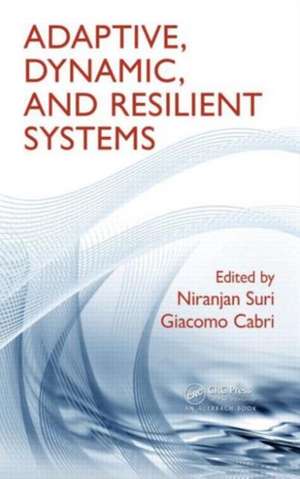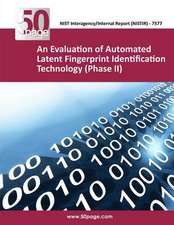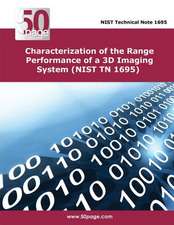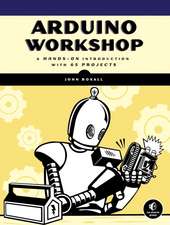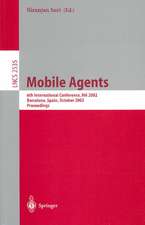Adaptive, Dynamic, and Resilient Systems
Editat de Niranjan Suri, Giacomo Cabrien Limba Engleză Hardback – 23 iun 2014
The book presents the insights of a different group of international experts in each chapter. Reporting on recent developments in adaptive systems, it begins with a survey of application fields. It explains the requirements of such fields in terms of adaptation and resilience. It also provides some abstract relationship graphs that illustrate the key attributes of distributed systems to supply you with a better understanding of these factors and their dependencies.
The text examines resilient adaptive systems from the perspectives of mobile, infrastructure, and enterprise systems and protecting critical infrastructure. It details various approaches for building adaptive, dynamic, and resilient systems—including agile, grid, and autonomic computing; multi-agent-based and biologically inspired approaches; and self-organizing systems.
The book includes many stories of successful applications that illustrate a diversified range of cutting-edge approaches. It concludes by covering related topics and techniques that can help to boost adaptation and resilience in your systems.
Preț: 684.41 lei
Preț vechi: 954.20 lei
-28% Nou
Puncte Express: 1027
Preț estimativ în valută:
130.96€ • 137.12$ • 108.62£
130.96€ • 137.12$ • 108.62£
Carte tipărită la comandă
Livrare economică 10-24 aprilie
Preluare comenzi: 021 569.72.76
Specificații
ISBN-13: 9781439868485
ISBN-10: 1439868484
Pagini: 378
Ilustrații: 99 black & white illustrations, 10 black & white tables
Dimensiuni: 156 x 234 x 25 mm
Greutate: 0.66 kg
Ediția:1
Editura: CRC Press
Colecția Auerbach Publications
ISBN-10: 1439868484
Pagini: 378
Ilustrații: 99 black & white illustrations, 10 black & white tables
Dimensiuni: 156 x 234 x 25 mm
Greutate: 0.66 kg
Ediția:1
Editura: CRC Press
Colecția Auerbach Publications
Public țintă
Professional Practice & DevelopmentCuprins
Introduction. Modeling Adaptive Software Systems. Service-Oriented Software Engineering Lifecycles. On Measuring Resilience in Command and Control Architectures. Resiliency and Robustness of Complex Systems and Networks. Resilient and Adaptive Networked Systems. Bringing Adaptiveness and Resilience to e-Health. Agile Computing. A Pattern-Based Architectural Style for Self-Organizing Software Systems. Adaptation and Resilience of Self-Organizing Electronic Institutions. Assessing the Resilience of Self-Organizing Systems. Leveraging ICT to Enable e-Maintenance for Automated Machines. Using Planning to Adapt to Dynamic Environments. Policy-Based Governance of Complex Distributed Systems. Adaptive and Resilient Computational Resource Allocation Inspired by Economics. Instrumentation-Based Resource Control.
Notă biografică
Niranjan Suri is a research scientist at the Florida Institute for Human & Machine Cognition (IHMC) and also a visiting scientist at the U.S. Army Research Laboratory, Adelphi, Maryland. He received his Ph.D. in computer science from Lancaster University, England, and his M.Sc. and B.Sc. in computer science from the University of West Florida, Pensacola. His current research activity is focused on the notion of agile computing, which supports the opportunistic discovery and exploitation of resources in highly dynamic networked environments. His other research interests include coordination algorithms, distributed systems, networking, communication protocols, virtual machines, and software agents.
Giacomo Cabri received the Laurea degree in computer science engineering from the University of Bologna in July 1995. In February 2000 he received the PhD in information engineering from the Dipartimento di Scienze dell’Ingegneria of the Universita di Modena e Reggio Emilia. He received a research contract by the Dipartimento di Scienze dell’Ingegneria of the Universita di Modena e Reggio Emilia, from January 1, 2001, to October 31, 2001. From November 1, 2001, to December 20, 2006, he was a research associate at the Facolta di Ingegneria of the Universita degli studi di Modena e Reggio Emilia, SSD ING-INF/05, position confirmed from November 1, 2004. From December 21, 2006, he has been an Associate Professor, SSD ING-INF/05 and his affiliation is the Dipartimento di Scienze Fisiche, Informatiche e Matematiche of the Universita di Modena e Reggio Emilia. He teaches different courses in the field of computer science and information technology, both basic ones and advanced ones. His research activities are mainly related to the following areas:
In these areas, he
Giacomo Cabri received the Laurea degree in computer science engineering from the University of Bologna in July 1995. In February 2000 he received the PhD in information engineering from the Dipartimento di Scienze dell’Ingegneria of the Universita di Modena e Reggio Emilia. He received a research contract by the Dipartimento di Scienze dell’Ingegneria of the Universita di Modena e Reggio Emilia, from January 1, 2001, to October 31, 2001. From November 1, 2001, to December 20, 2006, he was a research associate at the Facolta di Ingegneria of the Universita degli studi di Modena e Reggio Emilia, SSD ING-INF/05, position confirmed from November 1, 2004. From December 21, 2006, he has been an Associate Professor, SSD ING-INF/05 and his affiliation is the Dipartimento di Scienze Fisiche, Informatiche e Matematiche of the Universita di Modena e Reggio Emilia. He teaches different courses in the field of computer science and information technology, both basic ones and advanced ones. His research activities are mainly related to the following areas:
- Agents: base models and coordination protocols
- Autonomic computing
- Web applications
- Mobile computing
In these areas, he
Descriere
Examining cutting-edge adaptive systems research, this book addresses the challenges of understanding, predicting, and controlling systems of networked computers, particularly important when considering the intersection of critical infrastructure, complex systems, and resilience. The authors unveil novel approaches to building adaptive, dynamic, and resilient systems—including agile, grid, and autonomic computing; multi-agent-based and biologically inspired approaches; and self-organizing systems.
